|
The People Have Spoken
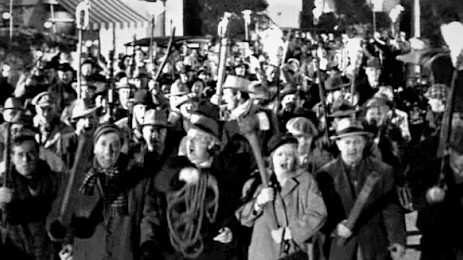
Well,
the popular vote is in and has been counted at least once. The Referendum had
one simple question: should I LEAVE the Getting
Away With Murder column, or REMAIN, no matter how much I squirm and whine?
An
impressive 110% (after independent adjudication) voted in favour of REMAIN,
with not a single LEAVE vote being registered and this, of course, can mean
only one thing. Another Referendum will have to be run, probably next year and
probably on this date.
Farewell Colin
March,
rather than April, was the cruellest month for fans and friends of Colin
Dexter, who died aged 86. Tributes from newspapers, television and the crime
writing community were profuse and generous and I have been allowed to add my
own very personal tribute on the Shots
features pages.
Out in the Cold Again
Those
once perky publishers Penguin held their annual Crime Fiction party last month
which was no doubt the perfect occasion to promote their forthcoming list of
exciting new titles.
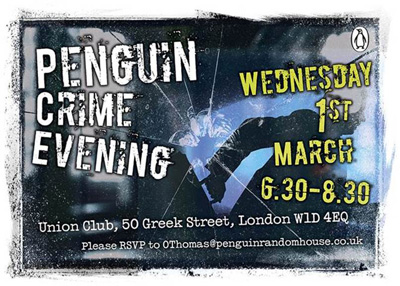
For
legal reasons (not being invited) I was unable to attend. So now we’ll probably
never know and for similar legal reasons, I can tell you nothing about the
crime fiction programme offered by Simon & Schuster.
Pretty
soon I might take the hint.
KK-BB
I
know I am asking for trouble announcing this on this particular date, but it
cannot be avoided. I really do have a new book our next month and it’s
non-fiction and it’s called – it really is – Kiss Kiss, Bang Bang.
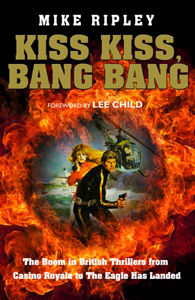
After
several years in the gestation, I am delighted that my ‘reader’s history’ of
the boom in British thriller writing 1953-1975 (or thereabouts) has been given
a home by HarperCollins in their famous Crime Club imprint, my very first
publisher, back in 1988, for Just Another Angel which started
what is laughingly called my career in
crime fiction. They have, therefore, a lot to answer for, but please do not
hold it against them as they done a splendid job indulging a great passion of
mine.
Kiss
Kiss Bang Bang – or KK-BB
as it is known in certain circles in honour of Len Deighton – has been
many years in its gestation, you might say about fifty years since, as a callow
youth, I realised that I was reading my way through a purple patch of British
thriller writing. Was it a ‘Golden Age’? Well, that is, as with all ‘Golden
Ages’ a matter for debate, but it was undeniably a boom time for British
thriller writers, who dominated international bestseller lists.
I
have taken as my time frame 1953 to 1975 (or thereabouts), which covers Casino
Royale to The Eagle Has Landed and gives me the chance to relive the
pleasures given to me at the time by authors such as Ian Fleming, John le
Carré, Len Deighton, Alistair MacLean, Hammond Innes, Desmond Bagley, Victor
Canning, Adam Hall, John Gardner, Gavin Lyall, Alan Williams, Lionel Davidson,
Jack Higgins, Frederick Forsyth, Wilbur Smith and Dick Francis along with a
host (150+ authors in all) of lesser-known names, many now forgotten and some
for probably very good reasons.
I
make no claims to my ‘reader’s history’ being anything other than a love-letter
to a generation of writers, some of whom I was privileged to meet in the course
of my own undistinguished, though lengthy, career, as a thank you for providing
my youthful self with so many ripping yarns.
The
book began to take shape during a course in creative writing I devised for
Cambridge University’s Institute of Continuing Education some years ago and
then at Crimefest in 2014 when a
panel discussion with colleagues Barry Forshaw and Peter Guttridge (on the
lines of What have old thriller ever done
for us?) brought home to me the fact that many excellent British writers
from this boom time were in danger of being forgotten.
I
was delighted to discover that others shared my enthusiasm for keeping their
names alive, not just Lee Child, who has contributed a thoughtful Introduction
to the book, and Ian Rankin, who has generously blurbed it in advance, but also
others I discovered during my researches, such as Andy McNab and Dame Stella
Rimington, who both turn out to be Hammond Innes fans, and Americans Dennis
Lehane and Justin Scott, who have expressed their admiration for the adventure
stories of Alistair MacLean and the ‘Quiller’ thrillers of Adam Hall.
Buena Vista Social Club
When
I first met Cuban crime-writing superstar Leonardo Padura, it was at a very
convivial event in 2009 in the company of his UK publisher, Francois von Hurter
(Bitter Lemon Press) and Sir Gerald Kaufman, who combined a long career as an
MP with a less well-known side-line as the crime fiction critic of The Scotsman newspaper.
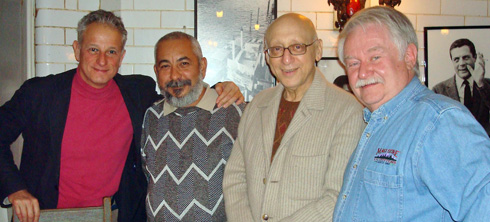
Sir
Gerald, who died last month aged 86, had his own personal system for
classifying crime fiction and though he had explained it to me several times
over the years, I never really understood it. Putting it crudely, I got the
impression that for Sir Gerald there were only two types of crime novels:
“entertaining” ones (though he did not use that word) and the “nasty, dark”
ones. That is probably a gross simplification and I may be doing Sir Gerald an
injustice, for whilst in his reviews he was clearly a fan of Marion Babson and
Veronica Stallwood, he also raved about the novels of Ruth Rendell and Carl
Hiaasen. In fact it was at one of Ruth Rendell’s birthday parties that Sir
Gerald told me the story (with actions) of how he had persuaded numerous
members of the House of Commons to read Carl Hiaasen’s Double Whammy and how the
infamous ‘pit-bull scene’ had caught on among MPs resulting in a secret sign
language which crossed party lines. I have no idea if that story was true, but
I so want it to be.
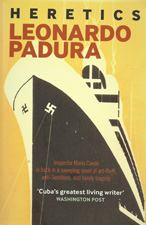
Leonardo
Padura will be in London again – next week as a matter of fact – to promote his
new book Heretics (Bitter Lemon), an ambitious novel, epic in scale,
which features his dog-eared detective Mario Conde – who even chain-smokes politically – not to mention his latest
dog, the down-trodden Garbage II. The action flits back to 1939 Havana and then
17th century Europe, chronicling dark episodes in both Jewish and
Cuban history. At the heart of the plot is a religious painting – probably a
Rembrandt – the property of Jewish refugees fleeing Nazi persecution which
disappeared in Havana and then surfaces in the 21st century in a
London sale room.
Heretics is long (500+ pages) and broad in scope,
and anchoring things in his own inimitable way
is former policeman Conde, part of that generation of Cubans forced ‘to
make a living clawing at the walls’ – in his case as a second-hand bookseller,
though one gets the impression that he is rescuing books rather than dealing in
them. If I have a problem with it – and I have to admit I have – then it is
with the translation, although I freely admit that my knowledge of the structure
and rhythms of Spanish does not extend beyond the small print on the label of a
bottle of Rioja. To me, the book seems to be ‘over-translated’ in the sense
that a novel can be ‘over-written’, with some very long and very flowery paragraphs
which probably make perfect sense in Spanish, but tend to falter and stall in
English. Perhaps that should be ‘under-translated’. Perhaps it’s just me. That
aside, there is much here to enthral and impress.
Cambridge
Black and Blue
The late, great Elmore Leonard famously postulated
his ‘Ten Rules of Writing’ although I am pretty sure his tongue was firmly in
his cheek when he did so, and Rule #2was “Avoid Prologues”. Whilst I would
rarely go against anything that Dutch said or wrote, I have to say I am rather
glad that the authors of two new novels have ignored his advice.
In fact Cambridge Black by Alison Bruce
[Constable] could be said to have its Prologue in the form of the previous six
novels in this impressive series featuring her police detective hero Gary
Goodhew, who has developed over the last eight years into one of the most
interesting characters in contemporary British crime fiction.
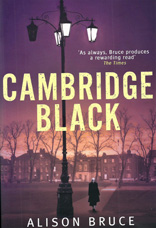
Being
a fictional detective, Goodhew of course has to have his quirks and his most
curious, and possibly most irritating, is his refusal to own a car thus
requiring him to travel to cases around Cambridge by taxi or in a rented vehicle
when a police car is unavailable. I admit I would love to see his expenses
claims, but really I flag this up purely for the benefit of anyone who has
tried to find a taxi in Cambridge after dark.
This
should not deter potential readers who will find much to admire and enjoy in
the Bruce/Goodhew view of the dark side of life in Cambridge – and this is a
Cambridge of back street builders’ yards, desolate industrial estates and
personal feuds and grievances festering among seemingly ordinary human beings.
There isn’t a gleaming spire (I know, I know, that’s the other place) in sight
and you are more likely to find a homeless guy hunting under a market stall for
fallen fruit and veg than be treated to a scene at High Table.
This
is a realistic Cambridge, closely observed warts and all and in Cambridge
Black an unsolved murder in Goodhew’s own family features in the
solving a contemporary killing which itself has roots in a vicious arson attack
twenty-five years ago.
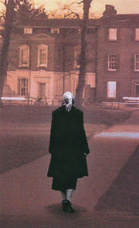
As
an added bonus,readers of Cambridge Black may notice the
striking blonde figure floating across a ghostly Parker’s Piece on the cover. Though
my eyesight is not what it was, I do believe that to be the author Alison
Bruce.
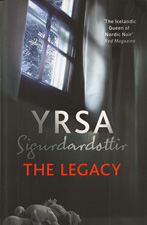
Another Prologue which should not be skipped is that
in The
Legacy, the latest ice shard of Icelandic noir from Yrsa Sigurdardóttir from Hodder and Stoughton. That
Prologue is spooky enough, but positively ‘Certificate PG’ compared to the
opening chapters and the first quite grotesque murder involving a method I am
happy to say I have never come across before in crime fiction.
Now I have to say I have met Yrsa Sigurdardóttir and
found her a most witty and charming person, one quite happy to autograph my
Penguin edition of The Vineland Sagas (which I maintain is the ultimate in Nordic Noir) without knowing why. That she
would come up with such a murder method shocked me considerably and though I
cannot say more without spoiling things, I have made a mental note never to
interrupt Yrsa whilst she is doing the housework.
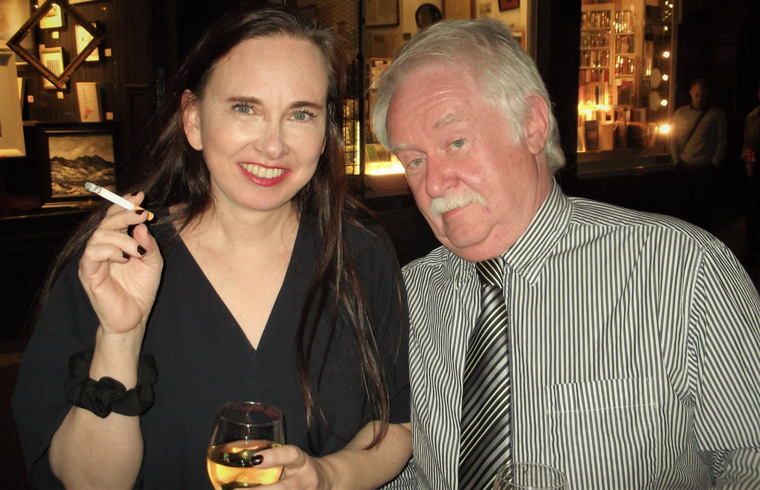
On hearing she was In London late last month, I
popped along to the launch party for The Legacy (despite not being
invited – again) to show my support,only to discover that Yrsa was cheerfully
relishing the shocked reaction to her murderous plot and gleefully announced
that her next book ‘would be even better’. My spine is already tingling.
Revival Corner
Two new titles from Ostara Crime this month beautifully demonstrate the breadth and scope of crime fiction, covering issues ranging from human trafficking and illegal immigration in modern Britain, to political skullduggery in Ancient Rome.
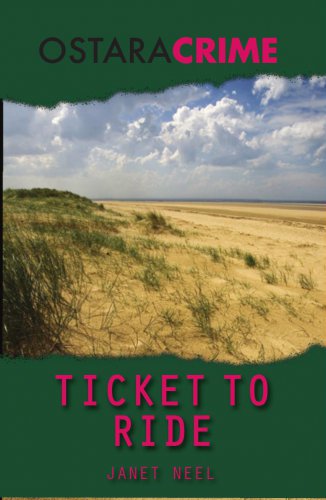 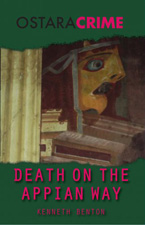
Ticket To Ride by Janet Neel (the writing name of Baroness Cohen of Pimlico), was first published in 2005 and plunges a newly-qualified lawyer into a case involving the deaths of eight migrant workers found buried in shallow graves on the East Anglian coast. Janet Neel’s feisty heroine Jules Carlisle has survived a chaotic childhood and has a fairly chaotic private life, but is determined to succeed in the legal profession. (Baroness Cohen was herself a lawyer.)
A rather more famous lawyer from a different age, was Marcus Tullius Cicero, who plays a central role in Death on the Appian Way by Kenneth Benton, first published in 1974 and a must for all fans of Robert Harris’ more recent ‘Cicero Trilogy’. Set in the final decades of the Roman Republic, this legal/political thriller show the author’s great knowledge and appreciation of Roman life and politics. The author, Kenneth Benton (1909-1999), a former Chairman of the Crime Writers’ Association, was far better known for his contemporary political/diplomatic thrillers, and his love for Rome almost certainly came from serving there both during and after World War II in his 30-year career as an MI6 officer.
|
|
Books of the Month Club
If you are going to write a debut thriller featuring an attractive, intelligent, go-getting television news producer trying to find a missing lawyer in the murky political underworld of Washington DC, then it probably helps to be an attractive, intelligent, go-getting television news producer yourself. Christina Kovac is exactly that and has done exactly that with The Cutaway (Serpent’s Tail).
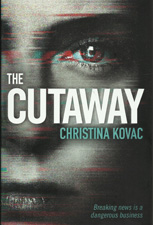
For all I know (though I doubt it), Christina Kovac may well have been branded a purveyor of ‘fake news’ by now and be in need of new career. Whatever her motives, her novel is a fast-paced conspiracy thriller showing the dangers of trying to carry truth to power in the Washington swamp. Ms Kovac clearly has a talent for turning over stones the powers-that-be don’t want turning and she can also turn a neat phrase, as when describing a deranged assailant as crazy as a shithouse rat. It is a phrase I will attempt to slip into conversation the next time the vicar comes to call.
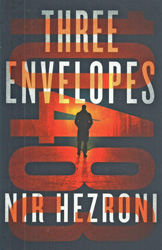
Another debut thriller, this time from Israel, also deals in conspiracy as a rogue agent surfaces after ten years missing in action and proceeds to create havoc in the higher echelons of the Israeli security services. Three Envelopes is a powerful debut novel by journalist Nir Hezroni, translated from the Hebrew and published by Point Blank. For most of the novel the central character is wound so tight he makes Jason Bourne look like a half-drunk hippy relaxing after a hard day’s weaving and through extracts from his journal, we realise he was an introverted, asocial, OCD-sufferer long before he became a spook. Fortunately he has the computer skills to alter all his official records (as well as the grit to get through some gruelling entrance exams!) and the nouse to invest in shares in Apple before he drops off the grid.
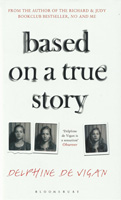
The idea of an ‘unreliable narrator’ – usually female – has been somewhat in vogue of late to say the least, with many publishers and writers jumping on the bandwagon of two or three notable commercial successes (you know who you are). In the same vein but posing more questions than answers is the 2015 French best-seller Based on a True Story by Delphine De Vigan (Bloomsbury) in which a successful novelist called Delphine, exhausted by endless book tours and signing sessions, meets the mysterious “L” who slowly begins to invade Delphine’s life, demanding to know what she is going to write next. When it becomes clear that “L’s” past life has actually come from a piece of fiction and when nasty anonymous letters begin to arrive, things take a very dark turn and the ultimate niggle at the back of the reader’s mind is whether Based on a True Story really is based on a true story. As the final scenes include a contemplation on the last revealing scenes of the movie The Usual Suspects, it is probably wise to maintain a healthy disbelief in everything you’ve read.

Within the first dozen pages of The Contract by J.M. Gulvin (Faber), I was reminded first of a scene from The Getaway (the Sam Peckinpah version) and then the quick draw shoot-first-ask-question-later technique of Raylan Givens in Elmore Leonard’s Justified television series. Both are pretty good reference points in my book. The Contract is the second outing for 1960s Texas Ranger John Quarrie (known as ‘John Q’), the type of Old West lawman who wears two guns– sometimes on the hip, sometimes in shoulder holsters – has a third tucked into his boot and often carries a pump-action shotgun. Surprisingly he does very little shooting after the opening scenes setting up his latest case which leads him to New Orleans where nobody can be trusted, especially the local law enforcement agencies, and Quarrie in effect has to investigate the huge conspiracy surrounding an assassination ‘contract’ working as a private eye.
The actual contract at the heart of the plot is a stunner – and is concealed until the big ‘reveal’ (though with hindsight you see the cleverly-placed clues) and the pace rarely falters. The Contract is a first-rate piece of American hard-boiled crime fiction, quite an achievement for Jeffery Gulvin, whom I believe to be British. It comes with a blurb of high praise from film director John Boorman (“magisterial grasp of time and place”), another Brit who knows a thing or two about hard-boiled Americana.

Gulvin’s protagonist, Korean War veteran ‘Quarrie’, should not, though probably will, be confused with Max Allan Collins’ Vietnam veteran protagonist ‘Quarry’ who is also involved in contract killings and who has featured in some 14 novels now since 1976 as well as last year’s television series in the US.
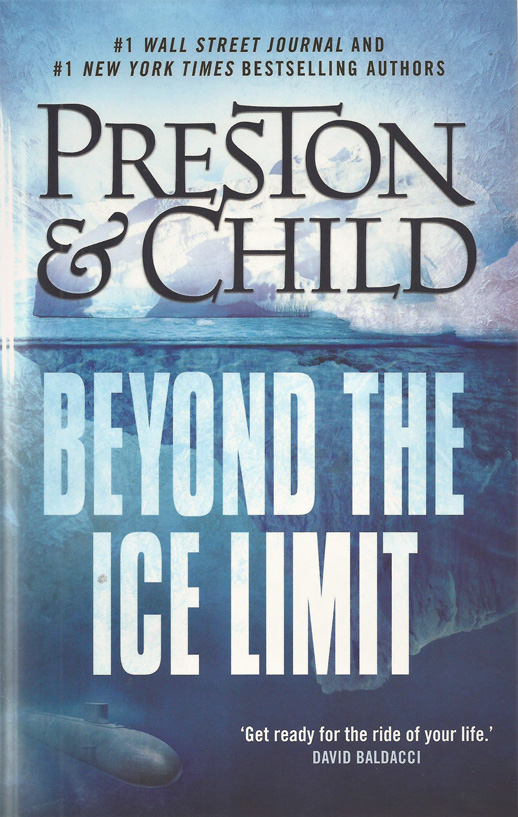
For those who like their thrillers flavoured with outlandish science, possible alien threat and potential global extinction, the name, or rather names, to watch is that of writing duo Preston & Child.
In fact you might say that Douglas Preston and Lincoln Child have cornered this rather exclusive market and their latest, Beyond the Ice Limit from Head of Zeus, contains all the crowd-pleasing ingredients one has come to expect: a meteorite from outer space, a shipwreck and a parasitical alien entity glowing – and growing – two miles down in Antarctic waters.
Flowers of Scotland (and Wales?)
(Ironically written on St Patrick’s Day…)
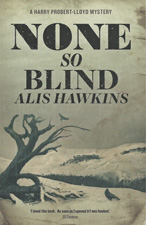
Last year, a small Glasgow publisher (Saraband) had a thoroughly-deserved monster hit with His Bloody Project by Graeme Macrae Burnet. Now another small Glasgow publisher, Freight
Books, could have another with None So Blind by Alis Hawkins, which is also a nineteenth-century historical thriller – a ‘social thriller’ if one can call it that – but set not in wild west Scotland, but in equally wild south Wales, at a time when having a police force (let alone detectives) was something of a novel concept.
Brilliantly recreating the harsh realities of 1850’s rural life in a Wales dominated by class and religion, and with an intriguing and engaging hero – a local lawyer made good in London, but slowly going blind, None So Blind could just be the sleeper hit of 2017.
Flagging Up
The idea of a dystopian future where civilisation as we know it has collapsed and the population is facing extinction (no, not Brexit for once) has long appealed to writers. Just think of classics such as Richard Matheson’s I Am Legend, Nevil Shute’s On the Beach and Harry Keating’s A Long Walk To Wimbledon.
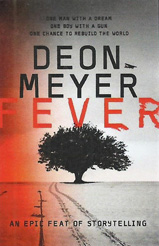
This year, South Africa’s leading crime writer Deon Meyer will give us his view of a post-apocalypse world in Fever, to be published by Hodder in June, in the form of a long family saga – a central father/son family and the wider family/community established by survivors in the wake of a devastating plague. The body count is high, and that’s not counting the 90% of the population wiped out by the ‘Fever’, as an idealistic community of survivors defends itself against marauding gangs from outside as well as divisions within.
There is a lot of technical survivalist detail, particularly on the subject of petrol and diesel fuels and, given Deon Meyer’s passion, there are plenty of motor-bikes. It is convincing enough so that the reader is sure that if a pandemic actually strikes, Deon Meyer is the sort of guy whose lead you would follow.
Fever is an impressive piece of dystopian science fiction and there’s an interesting murder mystery in there too, with lots of parallels to South Africa when it comes to trying to forge a new, more equal, integrated society.
Alter Ego?
Some years ago I acquired the July 1959 edition of Suspense (a paperback monthly anthology published by Amalgamated Press as a Fleetway magazine back then) because it offered short stories by Dashiell Hammett, Manning Coles Rebecca West and Berkely Mather. If that wasn’t value enough, I also discovered an author totally new to me: Robert Edmond Alter. His story – High Dive – had an unusual setting, the South Pacific, and intrigued me so much that I tried to find out more about Alter, an American, about whom little is actually known. In the late Fifties and early Sixties he seems to have been a prolific short story writer across several genres but his two best-known novels both appeared in 1966, the year he died in California at the age of 40.
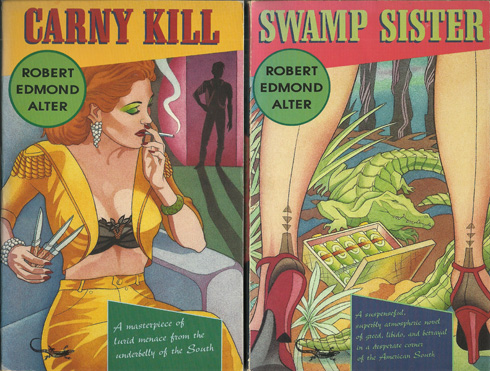
I quickly sought out Swamp Sister, a wonderfully sleazy piece of Southern Gothic noir, but it has taken me until now to track down Alter’s other novel, Carny Kill which promises more sleaze and unease – something you just can’t get enough of these days – in the world of a Florida carnival (called ‘Neverland’) ripe with shell-games, knife-throwers and politically-incorrect ‘novelty’ acts.
By the Beard of Zeus!
Or, to be more accurate: the Head of Zeus, who have just published their stunningly attractive second-half of 2017 catalogue. My eye was immediately drawn to a debut thriller to be published in August, The Room By The Lake, and have already noted it on my calendar as the author is Emma Dibdin, daughter of that late, great crime writer Michael, the creator of the wonderful Aurelio Zen novels.

Before then – this week actually – Head of Zeus are publishing the latest ‘Joe Pickett’ thriller, Vicious Circle by C.J. Box. It is, I believe, the 17th novel in the series featuring American game warden Pickett and, to the delight of his fans, Charles Box will be appearing at next month’s Crimefest in Bristol.
Top News from Down Under
No, not that I have had the honour to be asked to be a judge for the famous Ned Kelly Awards for Australian crime fiction – that was a rumour spread earlier this year by supporters of a rival rugby team. Rather, I am genuinely excited by the prospect, this November, of the publication of The Soldier’s Curse in the Point Blank imprint. The reason I am so eagerly awaiting this historical mystery, set in penal colony Australia, is because the author(s) are the father-and-daughter team of Meg and Thomas Keneally.
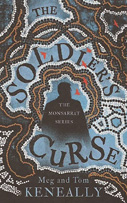 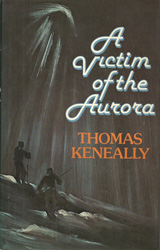
This is by no means Thomas Keneally’s first historical mystery, though at times I feel as if I am the only person who has ever read A Victim of the Aurora, his brilliant 1977 thriller set during a 1911 Antarctic expedition. He is, of course, best known for Schindler’s Ark but all his novels are worth reading and I list among my favourites Gossip from the Forest (1975) and Confederates (1979).
Political Thrillers
Over the last eighteen months or so it has seemed as if every BBC journalist was having a crack at writing a thriller, but this Autumn it’s the turn of politicians – or at least the politically connected.
In September, former LibDem Business Secretary Vince Cable’s political thriller Open Arms appears from Corvus to compete with Russian thriller Kompromat [Point Blank] by former MEP Stanley Johnson, the father of Foreign Secretary Boris. I am sure the multi-tasking former Chancellor George Osborne will soon find time to rattle one off as well.
Last Girly Word
Professor Barry Forshaw is always keen to have the last word and following my recent rant on novels with ‘Girl’ in the title, he has it again.

He quite rightly points out that this is not a new phenomenon and cites one of his favourite crime novels, Girl Running, from 1958 as proof.
Toodles!
The Ripster
|